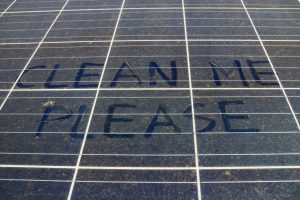 According to Science News for Students, air pollution is taking a toll on solar energy.
According to Science News for Students, air pollution is taking a toll on solar energy.
Air contaminants are sticking to the surfaces of solar panels, preventing light from reaching the solar cells below, and reducing the production of electricity. Not only are these consequences costly environmentally, they’re also quite costly economically.
Michael Bergin, a Duke University professor from the department of civil and environmental engineering, led a team from the University that collected dust and pollution from solar panels, learning more about its effects on renewable energy.
In India, the team calculated that natural dust and human-generated pollution cut solar electricity by roughly 1 gigawatt (or billion watts). Eastern China lost over 10 times as much, 11 gigawatts, from fossil-fuel pollution on solar panels.
Science News explains, “That’s the full power output of 50.6 million photovoltaic solar panels. It’s also equal to 5,500 large-scale wind turbines or 1,100 coal-fired power plants. And it’s the amount of energy needed to power 1.1 billion LED light bulbs.”
In other words, a substantial amount of energy lost, costing China $10 billion per year, says Bergin. Regular cleaning of solar panels can help, he says, mostly because “cleaning the air will prove a lot harder.”
Scientists and engineers are working hard on developing new renewable energy technology, by advancing solar technology and reducing air pollution. Scientists and engineers from around the world will come together at AiMES 2018 to discuss their research in the field, as well as developments in other disciplines within the electrochemical and solid state sciences. Meet the innovators of today and leaders of tomorrow this fall. Don’t miss it.

